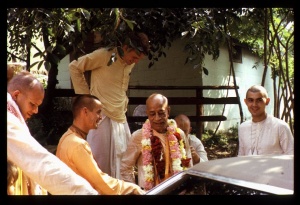SB 6.13.12-13

A.C. Bhaktivedanta Swami Prabhupada
TEXTS 12-13
- tāṁ dadarśānudhāvantīṁ
- cāṇḍālīm iva rūpiṇīm
- jarayā vepamānāṅgīṁ
- yakṣma-grastām asṛk-paṭām
- vikīrya palitān keśāṁs
- tiṣṭha tiṣṭheti bhāṣiṇīm
- mīna-gandhy-asu-gandhena
- kurvatīṁ mārga-dūṣaṇam
SYNONYMS
tām — the sinful reaction; dadarśa — he saw; anudhāvantīm — chasing; cāṇḍālīm — a woman of the lowest class; iva — like; rūpiṇīm — taking a form; jarayā — because of old age; vepamāna-aṅgīm — whose bodily limbs were trembling; yakṣma-grastām — infected with tuberculosis; asṛk-paṭām — whose clothes were covered with blood; vikīrya — scattering; palitān — grayed; keśān — hair; tiṣṭha tiṣṭha — wait, wait; iti — thus; bhāṣiṇīm — calling; mīna-gandhi — the smell of fish; asu — whose breath; gandhena — by the odor; kurvatīm — bringing about; mārga-dūṣaṇam — the pollution of the whole street.
TRANSLATION
Indra saw personified sinful reaction chasing him, appearing like a caṇḍāla woman, a woman of the lowest class. She seemed very old, and all the limbs of her body trembled. Because she was afflicted with tuberculosis, her body and garments were covered with blood. Breathing an unbearable fishy odor that polluted the entire street, she called to Indra, "Wait! Wait!"
PURPORT
When a person is afflicted with tuberculosis, he often vomits blood, which makes his garments bloody.